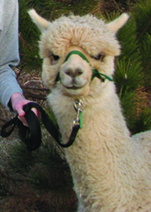Tender loving care
Lehning wrangles alpacas in her spare time
She keeps a scrapbook detailing their every milestone. When there's a chill in the air, she wrestles them into homemade fleece jackets. Each has its own personality and they're so adorable that Emily Lehning now has seven of them -- and counting.
To say that Lehning, K-State's assistant vice president for student life and accidental alpaca farmer, is dedicated to her animals is an understatement.
 "They're not your typical livestock," she said. "They definitely each have their own distinct personalities."
"They're not your typical livestock," she said. "They definitely each have their own distinct personalities."
Lehning said she and her husband, Jeremy, randomly came to the idea of alpaca farming one night watching TV when one of those cheesy "I love alpacas" commercials came on.
"We started joking about it and we got to the point where Jeremy said, 'you know, we should really do this,'" Emily Lehning said. "I said, 'you've got to be kidding me.'"
Emily Lehning, who grew up in Olivet, was in 4-H when she was a kid and helped raise many sheep and market pigs. Now, as a busy adult, she wasn't totally on board with the idea of raising alpacas. Working on recruitment and the needs of thousands of new K-State students keeps her occupied. Her husband is just as busy. He teaches at-risk students and coaches multiple sports in the Rock Creek School District.
"It was always something I thought we might do when we retired," Emily Lehning said.
But her husband, who grew up as a city kid in western Kansas, wanted to do it sooner.
"You got to do 4-H when you were growing up and I want to do 4-H at 30," Jeremy Lehning told his wife. He even came up with a formal proposal, complete with a budget and spreadsheets, detailing the benefits of alpaca farming.
Emily Lehning said she could hardly say no. "For him to be that interested in it was a surprise to me," she said.
So it became a team project. Together they worked out how to arrange their single acre estate near Westmoreland to accommodate the animals. Then they researched the kinds of alpacas they wanted to get, weighing qualities like demeanor, age and quality of fiber. Part of their plan was to harvest the animals' coats to use for products like yarn and rugs.
"We did a lot of research and tried to be realistic given our busy lives," Emily Lehning said.
In October 2007 they took the plunge, purchasing two year-old alpacas, Scout and Deja Blue, from a farm near Kansas City. Since then, they've acquired five more: Carl, Rugar, Manny, Magellan and Westminster.
 Side by side over the last year-and-a-half the Lehnings have learned how to care for the animals. Together they take care of the day-to-day physical chores, as well as a few in-depth research projects -- like watching YouTube videos on how to properly clip an alpaca's hooves.
Side by side over the last year-and-a-half the Lehnings have learned how to care for the animals. Together they take care of the day-to-day physical chores, as well as a few in-depth research projects -- like watching YouTube videos on how to properly clip an alpaca's hooves.
"I'm the holder and Jeremy's the clipper," Emily Lehning said. "It definitely takes two of us."
Through the experience, the Lehnings have not only learned a lot about caring for alpacas, they've even learned a little more about each other.
"The day-to-day maintenance has been some great, low fanfare couple time," Emily Lehning said. "There's nothing better than after a long day to go out and be with the animals."
She said it's also been fulfilling watching her husband deal with the animals. "It's been fun for me to see someone who did not grow up around animals develop a connection and an appreciation. A lot of times, we'll be out taking care of them and one of us will stop and say 'did you see that?'"
Though they didn't intend to have so many alpacas, Emily Lehning said as they learned more they were willing to add more to their herd.
"Manny, our fifth animal, and Magellan and Wes, our sixth and seventh, were added after people approached us. The previous owners were looking for a good home and we were able to assist," she said. "I think we agreed because we had gained more confidence in caring for the animals."
As spring approaches, the Lehnings are getting ready for their second harvest, when the animals are shorn and their blankets are sent to a mill in Phillipsburg to be made into yarn.
The Lehnings said they aren't into raising alpacas for money. They call it a lifestyle investment.
"I laugh because when we first started this our friends said you're going to make so much money on it," Emily Lehning said. "What we say is 'money will be made but we're not going to be making money.'"
More information on the Lehnings' alpaca farm and how the animals are doing is available at http://prairieschoolfarms.blogspot.com/
Photos: (Left) Emily Lehning shows off her bounty -- four different natural colors of yarn from her small herd of alpacas. (Right) Lehning holds Manny, one of her herd's recent additions.